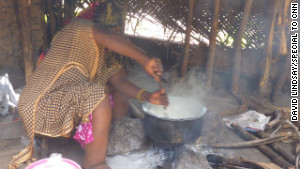When cooking can be deadly
David Lindsay
Dar es Salaam, Tanzania (CNN) -- An estimated 3 billion people -- nearly half the world's population -- still use an open fire as their primary source of energy for cooking and heating.
But there's a problem: the smoke.
"You have respiratory issues, lung disease, you've got pneumonia, and you've got longer-term issues like cancer and heart disease as well that can result from exposure to indoor air pollution," said Radha Muthiah, executive director of the Global Alliance for Clean Cookstoves.
The World Health Organization says this type of pollution causes nearly 2 million premature deaths each year. That's more than tuberculosis and three times as many as malaria.
Everline Kihulla is among the people trying to do something about it. She works for TaTedo, which manufactures and sells "clean cookstoves" in Tanzania.

TaTedo's stoves are made with clay liners that, along with other simple design features, emit far less smoke and fewer pollutants. And they use a fraction of the fuel.
"This (stove), we have improved it, and it currently uses almost 50%, compared to the traditional one," she said, crouching beside one of TaTedo's models. "The charcoal consumption here is less, compared to the traditional one."
Another benefit is that these stoves are made locally. A nearby workshop employs 21 people and churns out 400 to 500 stoves each month. Each person follows a cookstove through every stage of production, from pottery to painting. This teaches each worker a variety of skills.
Producing locally also boosts the economy and keeps costs down, although price is an issue. Cookstove prices start at about $6 (U.S.), a lot of money for many families in developing countries.
Still, Lillian Njuu, a Dar es Salaam resident, thinks the expense is worth the health of her family. She has used a clean stove for two years, she said, and she plans to buy another.
While the upfront cost to buy a cookstove is high, the fuel costs are lower because it burns less. That, in turn, has an environmental impact. Burning less charcoal or wood means there's less deforestation, something that has caused flooding and other major problems in many countries.
"It's one relatively simple intervention that has a multitude of impacts," Muthiah said.
Now, the challenge is to get clean stoves into enough homes to really make a difference.
David Lindsay is the managing editor of Global Health Frontline News. For more global health stories, go to www. ghfn.org.
